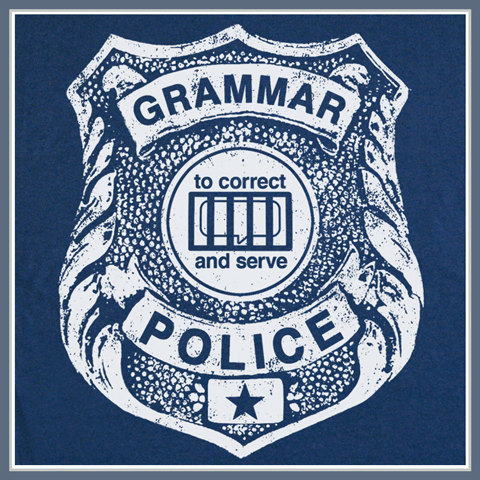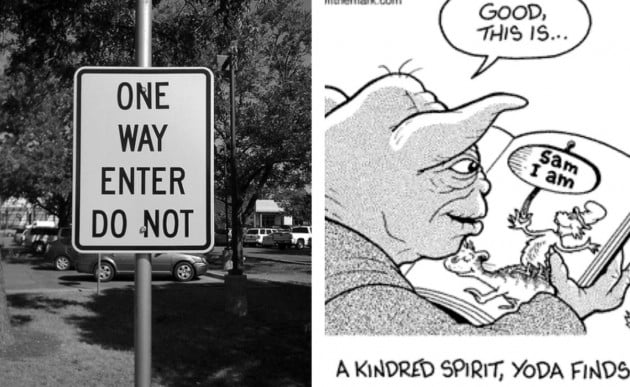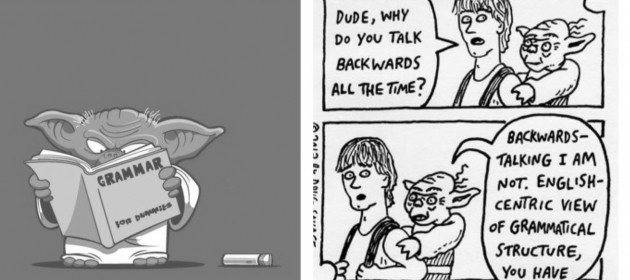Spoken like a True Jedi Master
 With linguistic interests like mine, I find I’ve developed a few habits when not keeping up with the latest language trends. I mentally correct books I read and sometimes make notes of the corrections and leave them in the book, just in case my husband reads it. He uses these slips of paper as bookmarks and, I assume like most people, doesn’t really notice or care when the author has misused an apostrophe or misspelled something. My mental auto-correct sometimes carries over into TV and movie time. Recently having a Star Wars marathon, my husband (whose first language is Spanish) asked me why I never correct Yoda’s speech.
With linguistic interests like mine, I find I’ve developed a few habits when not keeping up with the latest language trends. I mentally correct books I read and sometimes make notes of the corrections and leave them in the book, just in case my husband reads it. He uses these slips of paper as bookmarks and, I assume like most people, doesn’t really notice or care when the author has misused an apostrophe or misspelled something. My mental auto-correct sometimes carries over into TV and movie time. Recently having a Star Wars marathon, my husband (whose first language is Spanish) asked me why I never correct Yoda’s speech.
“The same reason I don’t correct you. Yes, English seems to be the galactic standard language, but that doesn’t necessarily mean it’s his first language.”
After a short pause my husband looked at me and said, “But you DO correct me.”
I had just taken a rather large bite of pizza and found myself unable to politely respond. This was not at all related to the fact that I didn’t have a comeback. Really.
Back to Yoda. There are many theories as to his odd syntax; one is that at 900 years old his speech is markedly different from that of current standard because he is speaking in archaic sentence structures. While the current standard generally revolves around a Subject-Verb-Object structure, Yoda often speaks using a, grammatically correct though antiquated, Object-Subject-Verb style that may have been meant to medievalise his speech.
SVO: She will fight.
OSV: Fight she will.
While not currently en vogue, OSV word order has been used by poets and the like for rhythmic reasons, and it’s still used to this day for emphasis. If she’s determined to fight, fight she will!
The problem with this theory comes into play when we get sentences from Yoda that don’t follow what Star Wars enthusiasts have termed Yodish or Yodic. More commonly when there is an auxiliary verb, the auxiliary verb is shifted with the subject and the verb stays at the forefront. For example:
“Trained as a Jedi he must be.”
Other times the whole verb phrase is shifted.
“With this Naboo queen you must stay.”
These instances make me side with those who theorize that English is not Yoda’s first language. Within the film’s logic this makes sense, in a reality where there a creatures from many different planets congregating, it makes sense that not everyone will be speaking English—even if it is the standard. From a linguistic standpoint this theory holds water. If Yoda speaks a different language natively, then he will be prone to the code-switching common to those who speak more than one language (like people who speak Spanglish).
Another similarity I have found between the Jedi Master and other non-native English speakers is the great care taken to be grammatically correct in instances where the message is of great importance. One can’t help but take extra notice when after mostly non-standard word order Anakin is warned, “A Jedi uses the Force for knowledge and defense, never for attack.” Yoda means to be understood at all costs.
Whether the writers did this deliberately, I cannot say. That’s why the internet is rife with arguments about proper Yodish usages and it’s consistency between the original trilogy and the prequel trilogy.
In the end, whether he is a native speaker of 900 year old English or speaks it as his second language, who am I to correct a Jedi Master? That’s what spouses are for.
Do you find yourself correcting the grammar of others? How do they feel about it? What is your opinion on Yodish? Simple to imitate, it is.


